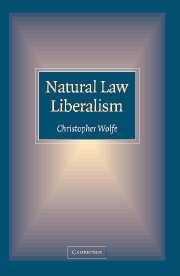Book contents
- Frontmatter
- Contents
- Acknowledgments
- Introduction
- PART I CONTEMPORARY LIBERALISM
- 1 Contemporary Liberal Exclusionism I: John Rawls's Antiperfectionist Liberalism
- 2 Contemporary Liberal Exclusionism II: Rawls, Macedo, and “Neutral” Liberal Public Reason
- 3 Contemporary Liberal Exclusionism III: Gutmann and Thompson on “Reciprocity”
- 4 Contemporary Liberalism and Autonomy I: Ronald Dworkin on Paternalism
- 5 Contemporary Liberalism and Autonomy II: Joseph Raz on Trust and Citizenship
- 6 “Offensive Liberalism”: Macedo and “Liberal” Education
- PART II LIBERALISM AND NATURAL LAW
- Index
5 - Contemporary Liberalism and Autonomy II: Joseph Raz on Trust and Citizenship
Joseph Raz
Published online by Cambridge University Press: 24 July 2009
- Frontmatter
- Contents
- Acknowledgments
- Introduction
- PART I CONTEMPORARY LIBERALISM
- 1 Contemporary Liberal Exclusionism I: John Rawls's Antiperfectionist Liberalism
- 2 Contemporary Liberal Exclusionism II: Rawls, Macedo, and “Neutral” Liberal Public Reason
- 3 Contemporary Liberal Exclusionism III: Gutmann and Thompson on “Reciprocity”
- 4 Contemporary Liberalism and Autonomy I: Ronald Dworkin on Paternalism
- 5 Contemporary Liberalism and Autonomy II: Joseph Raz on Trust and Citizenship
- 6 “Offensive Liberalism”: Macedo and “Liberal” Education
- PART II LIBERALISM AND NATURAL LAW
- Index
Summary
I want to turn now to an argument of a distinguished contemporary liberal political theorist, Joseph Raz of the Oxford, that moral paternalism is inadmissible because it denies people full citizenship and undermines the necessary trust of citizens. This chapter takes up the critique of Raz on autonomy begun in Robert George's critique of Raz's earlier work on autonomy.
Raz is a liberal. However, he is unlike many other liberal theorists (e.g., Ronald Dworkin) in his straightforward assertion that autonomy is not an unqualified good. He says that “the good life is a successful autonomous life, that is life consisting in the successful pursuit of valuable activities and relationships largely chosen by the person involved.” The assertion that autonomy is successful only if used for valuable activities makes Raz a distinctly atypical liberal.
Raz is also, however, firm in his adherence to the “harm” principle: he is opposed to coercive moral paternalism. Government should not coercively restrain moral autonomy even when it is used to pursue activities that are not morally valuable, as long as other people are not relatively directly harmed. His argument in “Liberty and Trust” is another part of his effort to defend this combination of perfectionism and contemporary liberal commitment to the harm principle.
COERCION
Raz begins by indicating some serious reservations about coercion. Coercion, says Raz, “violates a person's independence by subjecting him to the will of another.”
- Type
- Chapter
- Information
- Natural Law Liberalism , pp. 82 - 99Publisher: Cambridge University PressPrint publication year: 2006
- 1
- Cited by

